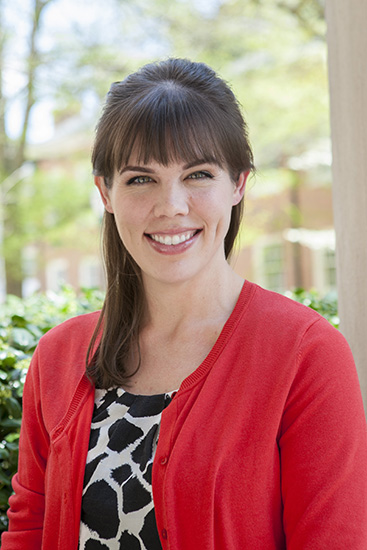
Position: Assistant Professor of Pharmacy Practice
Teaching at Samford since 2011
Bonus fact: Dr. Skelley and her husband, Jason, are both from Jacksonville, Florida, but did not meet until they were undergraduates at Samford.
Why do you teach? Why do you teach at Samford? I teach because I love to learn, to be challenged and to have a career where it’s necessary for me to stay informed and up-to-date on drug therapies and practice guidelines. Also, I teach because some of the people who have had the greatest impact on me, personally and professionally, have been the teachers and professors that I had during the course of my education. There is nothing like seeing a student connect on a personal level with a profession or with a concept. The ability to be the person that helps make those connections possible is exceptionally rewarding. Samford has truly become a home to me. The relationships I have developed with students and colleagues and the faith-based mission-minded community combined with the dedication to excellence in education makes it a very special place to be a part of.
What is one thing you want your students to know when they graduate from Samford? There are so many areas of practice within pharmacy. We can practice in places like hospitals, community pharmacies, family medicine clinics or specialty clinics. It is important that each student finds an area that he or she is passionate and excited about and that best utilizes his or her unique set of skills to help transform the lives of patients. That area of practice is going to be different for everyone, and sometimes those interests change with time as well. Finding your niche not only is what makes an effective pharmacist, but a fulfilled pharmacist. It’s not about the money, or about doing what is easy and available. You’ll have to work hard and potentially put in some long hours. But, the beautiful thing about doing something you love is that it often doesn’t seem like work at all. That’s what I hope each of them finds one day.
What is your favorite non-Samford activity? Why? I love to bake and really enjoy home renovation projects. Thankfully I have a husband who loves to eat and is pretty great with a circular saw. We make a good team! There is something really special about enjoying something that you’ve not just paid for but actually created yourself.
How did your background prepare you for your current role at Samford? I completed my doctor of pharmacy education at Samford’s McWhorter School of Pharmacy and then went on to complete a year of postgraduate residency training in what was essentially a primary care based-setting. I now practice in a family medicine clinic that also trains medical residents who are preparing to be family medicine physicians and teach them alongside of the pharmacy students who complete their clinical rotations at my practice site. The education that I received at McWhorter as a student pharmacist prepared me to be the practitioner that I strive to be today: one who is service-oriented, patient-focused and dedicated to achieving excellence. Those are the same qualities that I try to impart to my own students in much the same way they were once taught to me
Why is encouraging current pharmacy students so important to you? I had some exceptional professors who taught me as a student and who showed me the importance of student mentorship. Because of the impact that they had on me and my development as a pharmacist, I know the opportunities that I have as a faculty member to be a role model and source of encouragement to our students. Unfortunately, it is very easy to become cynical and discouraged in the practice of healthcare. Students need positive role models that remind them of the importance of what they are doing and why they fell in love with the practice of pharmacy in the first place.
Why are pharmacists so important in today’s health-care environment? Pharmacists are the most readily accessible health-care professional available to the public and often we are the first person a patient seeks out when they have an issue, whether to ask for advice, to get a product recommendation or to figure out if they need to see a physician. On top of that, we see patients more regularly than any other provider due to their monthly prescription refills. There is such a significant potential for pharmacists to have an impact on patient health in every setting. We truly are the medication experts. I’m thanked often enough by the physicians with whom I work with for my drug knowledge to be reminded of this fact. We as pharmacists have a unique set of skills to assist in the management and supervision of complex drug therapies as part of a medical team, and that is an attribute being highly sought after in today’s health-care environment that is so focused on patient-centered, quality-driven care.
What’s one thing that most students do not know about you? I was an abysmal student in general chemistry, to the point that I had to seek out another Samford student to tutor me in order to be successful in the course. I didn’t have a strong chemistry program at the high school that I attended, so it was a steep learning curve for me. It worked out in the end, though. I passed the course, and two years later married my tutor. Our first date actually resulted from a thank you dinner I was supposedly treating him to for helping me pass the course with a B, except I didn’t realize it was a date until the end when he wouldn’t let me pay for the meal!
